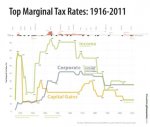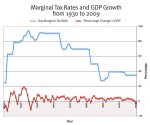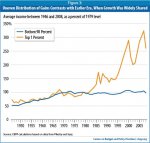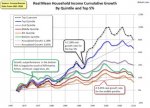Conaeolos
DP Veteran
- Joined
- Jun 5, 2017
- Messages
- 1,994
- Reaction score
- 416
- Gender
- Male
- Political Leaning
- Other
Re: What is the "Fair Share" that democrats talk about?
By the way, for those curious. Remember when I said that 1% wealth tax doesn't really actually effect the current 1% only those joining them year over year?
It all comes back to how Jeff isn't liquid enough to cover a 1% tax. He could change that quite easily and would if those were the conditions. If for example his investment paid dividends he would have a lot of income.
There in lays the problem. There was a time in '97 amazon stock sold for $1.54/share. That is very accessible. Today it sells for $1620.62 per share. A lot less accessible. That is because its a business model based on growth. They don't pay out they invest in growth.
When owners extract wealth for income from it every year that slows the growth and ups the price lowering access. A lot. Hence the result is opportunities would only exist in non assessable dividend paying stocks and assessable growth stock a rare gem indeed.
And that is not just true of stock. It's a difference between a growth pattern and a maintenance pattern.
By the way, for those curious. Remember when I said that 1% wealth tax doesn't really actually effect the current 1% only those joining them year over year?
It all comes back to how Jeff isn't liquid enough to cover a 1% tax. He could change that quite easily and would if those were the conditions. If for example his investment paid dividends he would have a lot of income.
There in lays the problem. There was a time in '97 amazon stock sold for $1.54/share. That is very accessible. Today it sells for $1620.62 per share. A lot less accessible. That is because its a business model based on growth. They don't pay out they invest in growth.
When owners extract wealth for income from it every year that slows the growth and ups the price lowering access. A lot. Hence the result is opportunities would only exist in non assessable dividend paying stocks and assessable growth stock a rare gem indeed.
And that is not just true of stock. It's a difference between a growth pattern and a maintenance pattern.




